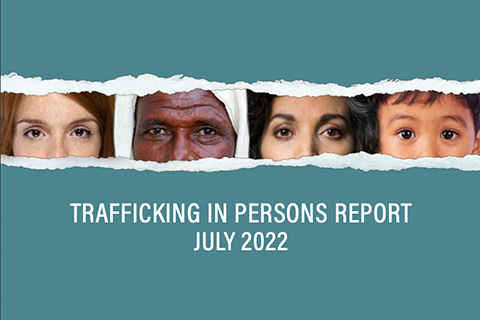Today, the U.S. State Department released its annual Trafficking in Persons (TIP) Report. The TIP Report plays a key role in the global fight against human trafficking by holding governments around the world accountable for their policies on this issue, providing key data for the field, and highlighting pertinent trends and issues.
One of the report’s key themes this year is the importance of engaging survivors to better address and respond to trafficking. Meaningfully engaging survivors is critical, and the report rightfully highlights the need to support and amplify survivor experts and leaders. Humanity United applauds the State Department’s emphasis on prioritizing the needs and voices of survivors and those with lived experience in this year’s report.
The report also notes that climate change will continue to exacerbate vulnerabilities, particularly for those forced to migrate. It rightfully highlights the need to ensure forced labor is not a part of present or future clean energy supply chains or infrastructure development.
Finally, the report raises the necessity of linking efforts to combat corruption and human trafficking, citing examples of how corruption has helped facilitate human trafficking in a number of different sectors and contexts, including fishing, the kafala system, and construction related to the FIFA World Cup. The report also notes the prevalence of forced labor exploitation in China’s Belt and Road Initiative projects.
On the TIP Report country rankings, Humanity United agrees with the decision to keep Qatar at Tier 2. While Qatar continues to make progress on addressing forced labor, we still do not believe it is meeting the minimum standards. Although the Qatari government has passed numerous laws containing important reforms, there continues to be poor implementation of these laws. In particular, the report notes that workers continue to face obstacles to changing jobs without an employer’s permission, and recommends the government prohibit employers from misusing absconding charges, non-compete clauses, cancellation of residency and visa permits, as well as threats to withhold workers’ salaries and benefits in order to prevent them from changing jobs. These practices represent a disappointing regression and demonstrate that though elements of the kafala system have ended on paper, in practice the system continues to keep disproportionate power in the hands of employers and places workers at risk of forced labor and trafficking.
We were disappointed to see Thailand upgraded to Tier 2 and Taiwan remain at Tier 1. Labor trafficking continues to be a serious problem in the seafood industries of these countries, with the 2022 TIP Report highlighting research from 2019 and 2020 which indicates that between 14 and 18 percent of migrant fishers in the Thai fishing industry were exploited in forced labor. The report notes both countries are struggling with identifying and protecting victims, and are not conducting effective labor inspections to prevent trafficking or stopping exploitative recruitment practices. This year’s report specifically highlights that Thai authorities have never reported identifying a victim of labor trafficking as a result of fishing vessel inspections conducted at ports, and at-sea inspections of over 600 vessels did not identify any violations. Additionally, the lack of clear guidance regarding work and rest hours for workers on fishing vessels increased their risk of trafficking. For Taiwan, the report highlights the ineffective efforts to identify, investigate, and prosecute forced labor on fishing vessels in Taiwan’s Distant Water Fleet (DWF), and it notes the need to increase inspections of Taiwan-owned fishing vessels in the DWF and to prosecute senior crew and owners of these vessels where appropriate. We hope that Taiwan addresses this, and that its future rankings accurately reflect its commitment to addressing this issue.
Finally, the 2022 TIP Report highlights a number of areas where the United States can improve. In particular, the report notes that there continues to be a “lack of progress to comprehensively address labor trafficking in the United States, including in efforts to identify victims, provide them specialized services, and hold labor traffickers, including contractors and recruiters, accountable.” The report specifically recommends better screening for human trafficking among individuals in immigration detention or custody. While we are encouraged that the United States continues to increase its efforts to stop imports of goods made by forced labor, this also remains an area where more enforcement is needed, particularly in light of the rebuttable presumption that all goods from Xinjiang are products of forced labor.
